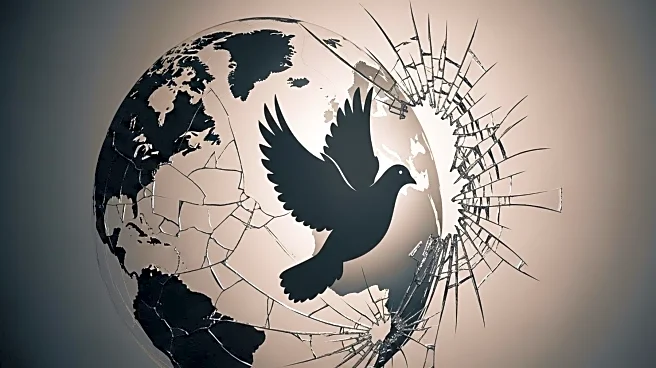What's Happening?
Tunisian filmmaker Kaouther Ben Hania has premiered her latest feature film, 'The Voice of Hind Rajab,' at the Venice Film Festival. The film is based on the real-life story of Hind Rajab, a six-year-old girl trapped in a car in Gaza during a conflict on January 29, 2024. The film uses a blend of documentary and dramatization to depict the harrowing final calls of Hind, who was in contact with the Palestine Red Crescent Society for over an hour before an ambulance sent to rescue her was destroyed. The film features the original recordings of Hind's voice, aiming to honor her memory and highlight the silence and complicity of international media in the face of suffering in Gaza.
Why It's Important?
The film sheds light on the ongoing humanitarian crisis in Gaza, emphasizing the lack of international intervention and support for victims like Hind Rajab. By using real recordings and dramatization, Ben Hania aims to provoke empathy and awareness about the plight of Palestinian children affected by conflict. The film has garnered support from Hollywood figures, raising hopes that Hind's story will reach a wider audience and potentially influence public perception and policy regarding the Gaza conflict. Tunisia has selected the film as its official entry for the Academy Awards in the best international feature category, further amplifying its impact.
What's Next?
Following its premiere at Venice, 'The Voice of Hind Rajab' is set to be screened at the Toronto Film Festival, potentially increasing its visibility and influence. The film's reception may spark discussions on the ethical responsibilities of filmmakers and media in representing conflict and suffering. It could also lead to increased pressure on international bodies to investigate and address the humanitarian issues in Gaza. The involvement of high-profile executive producers may help in advocating for justice and support for affected families.
Beyond the Headlines
The film raises questions about the role of cinema in documenting and responding to real-world tragedies. It challenges audiences to consider their own complicity in global conflicts and the power of storytelling in driving social change. The film's focus on Hind's voice highlights the broader issue of silencing Palestinian narratives and the need for empathy and action in addressing human rights violations.









